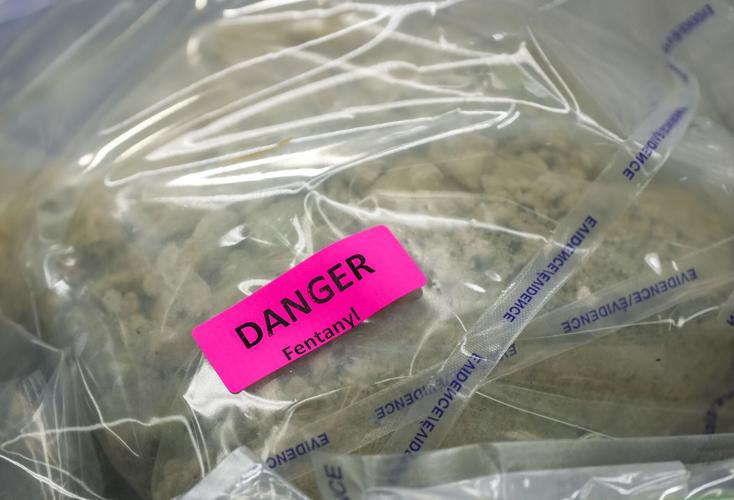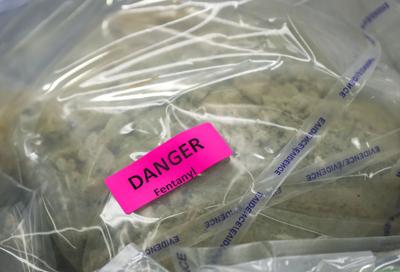As Donald Trump has raged, Canada has reacted.
In December, the federal government pledged an additional $1.3-billion to combat fentanyl trafficking, with increased border security measures that include drones, Black Hawk helicopters and mobile surveillance towers.
In February, Ottawa appointed its first ever ÔÇťfentanyl czar,ÔÇŁ longtime senior Mountie Kevin Brosseau, to oversee our fight against the deadly synthetic opioid.
However some contend that organized criminals around the world ÔÇö including Canada ÔÇö have already entered into a golden age of drug trafficking. For all of his protestations, critics say, Trump may have turbocharged this crime renaissance by firing experts, poisoning results-based co-operation between nations, and emboldening criminals on the dark web.┬á
ÔÇťOrganized crime, one of the worldÔÇÖs oldest professions, is entering a golden age,ÔÇŁ authors and crime experts Misha Glenny and Robert Muggah write in the current issue of Foreign Policy.
This isnÔÇÖt just a Canadian thing, though thereÔÇÖs plenty to observe in Canada as organized criminals here scramble to keep up with their foreign counterparts.
It seems their networks have become more sophisticated since the pandemic years.
ÔÇťCartels, mafia networks, and freelance gangsters quickly learned the ins and outs of private banks, tax havens, special economic zones, container ports, and online markets,ÔÇŁ Glenny and Muggah write.
This includes modernizing their leadership.
ÔÇťWithin criminal organizations, digital natives have started replacing less tech-savvy mafia bosses and operatives,ÔÇŁ Glenny and Muggah write. ÔÇťAs a result, cybercrime has evolved from lone-wolf attacks to highly skilled criminals hunting in packs.ÔÇŁ
In his first public appearance Wednesday, Kevin Brosseau shared few details about his new role,
Here in Canada, that means that organized criminals are co-operating more than before, Criminal Intelligence Service Canada (CISC) notes in its newly released annual report.
Cocaine is the market in which most┬áorganized crime groups are involved, “and involvement is increasing with pricing at its lowest in 25 years,” the CISC notes.
This comes as the number of organized crime groups producing illicit synthetic drugs almost doubled from 2023 to 2024, according to the CISC report.
ÔÇťFentanyl and methamphetamine activities continue to expand,” the CISC report adds, noting involvement in fentanyl has increased by 42 per cent since 2019.
There are several reasons why organized crime ÔÇö and the drug trafficking business in particular┬áÔÇö is undergoing a dark renaissance.
Synthetic drugs like fentanyl and methamphetamine require no growing season, unlike plant-based drugs such as marijuana, cocaine, opium or heroin.
Propelling things at warp speed is the dark web, which provides ÔÇťan efficient, covert space to mask or conceal criminal transactions, identities, and other illegal activity,ÔÇŁ the CISC writes.
ÔÇťExamples include the use of underground banking or cryptocurrencies to facilitate the laundering and international movement of money,ÔÇŁ the CISC writes. ÔÇťSuch methods provide an avenue that is challenging for law enforcement to trace. They are also highly appealing due to their removed and global nature; there are no geographic or physical limitations to these methods.ÔÇŁ
Dozens of Canadian organized crime groups are ramping up their production of the illegal opi…
Just weeks after assuming the American presidency, Trump pardoned Ross Ulbricht, who had been serving a life term for running the underground online marketplace Silk Road, where drug dealers and others conducted more than $200 million in illicit trade using bitcoin online.
“I just called the mother of Ross William Ulbricht to let her know that in honor of her and the Libertarian Movement, which supported me so strongly, it was my pleasure to have just signed a full and unconditional pardon of her son, Ross,ÔÇŁ Trump wrote in a post on his social media platform, Truth Social. ÔÇťThe scum that worked to convict him were some of the same lunatics who were involved in the modern day weaponization of government against me.ÔÇŁ
With the emergence of quicker and simpler methods to make fentanyl as well as fentanyl analogues, the drug became a large-scale player on the illicit market of North America by about 2013.
Around 2020, trafficking networks in the U.S. and Canada began producing fentanyl themselves. Americans jumped in with both feet, despite Trump blaming Canadians for flooding the American market. 
A large majority, 86.2 per cent, of those arrested for illegal fentanyl sales in the U.S. were U.S. citizens, the Sentencing Commission, an independent American federal agency, reported in its report for the 2023 fiscal year.
Groups shipping fentanyl and chemicals to make fentanyl are taking advantage of old reliable routes and tactics that have worked for years to move cocaine, authorities say.
Trump has threatened retaliatory 25 per cent tariffs on Canadian goods going to the
Politics have also played a role in the drug trafficking renaissance.
The quality of governance makes a profound difference, Amy MacKinnon notes in the Feb. 17 edition of Foreign Policy.
She argues that democracies tend to cope with organized crime better than authoritarian regimes.
ÔÇťIn recent years, however, liberal democracies have been on the back foot,ÔÇŁ MacKinnon writes. ÔÇťThe 2008 financial crisis, increased migration in the 2010s, and the far-reaching impacts of the COVID-19 pandemic have strengthened populist movements across Europe and North America. Populist leaders often circumvent democratic checks and balances, with direct and indirect benefits for organized crime. One of the first acts of the new U.S. Attorney General, for example, was to eliminate anti-corruption units targeting kleptocrats.ÔÇŁ
Tensions surrounding Trump globally complicate the fight against illegal drug trafficking.
The Trump administration has accused the Mexican government of colluding with the drug cartels. Mexico’s President Claudia Sheinbaum called the accusations “slander.”
President Trump has accused Canada ÔÇö alongside Mexico ÔÇö of allowing “vast numbers of people to come in and fentanyl to come in” to the US.
As for the future, organized crime groups are likely to turn to even more potent and profitable fentanyl alternatives, according to the CISC, such as nitazene and medetomidine.


































To join the conversation set a first and last name in your user profile.
Sign in or register for free to join the Conversation